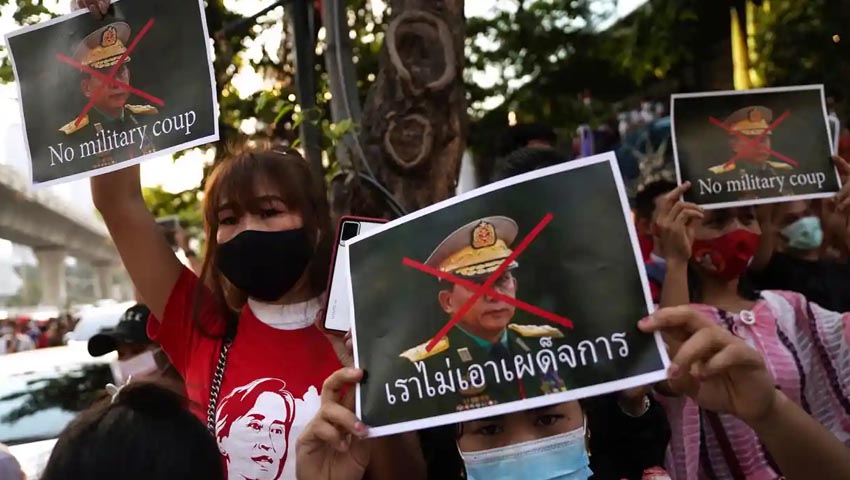The Biden administration has been warned against imposing heavy sanctions on Myanmar following a military takeover of its democratically elected government.
Earlier this month, military officials ousted Myanmar’s democratically elected government, detaining political representatives including State Counsellor Aung San Suu Kyi and President Win Myint.
The military coup was sparked by a dispute over the outcome of Myanmar’s election in November, which senior military officials alleged was fraudulent.
Myanmar’s chief of the armed forces, Senior General Min Aung Hlaing, has assumed control of the government under a one-year-long state of emergency.
The coup was widely condemned by the international community, with G7 nations – Canada, France, Germany, Italy, Japan, the UK, and the US – jointly calling for the release of detainees.
“We stand with the people of Myanmar who want to see a democratic future,” the statement reads.
Western leaders have since backed the imposition of a new wave of sanctions on the embattled south-east Asian nation, with US President Joe Biden warning that the coup would “necessitate an immediate review of our sanctions laws”.
But according to Brahma Chellaney, professor of strategic studies at the New Delhi–based Centre for Policy Research, tougher sanctions would be a mistake.
In a piece published by the Australian Strategic Policy Institute (ASPI), Chellaney cast doubt over the utility of a punitive response, given the current regional environment.
“The retreat of the ‘Myanmar spring’ means all the countries of continental south-east Asia – Thailand, Laos, Cambodia, Vietnam and Myanmar – are under authoritarian rule, like their giant northern neighbour, China,” he writes.
“More fundamentally, the reversal of democratisation in Myanmar is a reminder that democracy is unlikely to take root where authoritarian leaders and institutions remain deeply entrenched.
“Given this, a punitive approach would merely express democratic countries’ disappointment, at the cost of stymying Myanmar’s economic liberalisation, impeding the development of its civil society, and reversing its shift towards closer engagement with democratic powers. And, as in the past, the brunt of sanctions would be borne by ordinary citizens, not the generals.”
Chellaney noted that US-led sanctions on Myanmar would call into question Western relations with other authoritarian regimes in south-east Asia.
“Thailand’s army chief, with the support of an increasingly unpopular king, has remained ensconced in power in civilian garb since staging a coup in 2014,” he continues.
“If the United States can do business with Thailand, where a crackdown on pro-democracy protesters has extended to the use of a feared lèse-majesté law to imprison those who insult the royal family, why hold neighbouring Myanmar to a higher standard?
“Likewise, the US, India, Japan and others have established close defence ties with communist-ruled Vietnam. Indeed, the US boasts that in recent years it has established a ‘robust security partnership’ with Vietnam.”
The professor argues that opening lines of communication and cooperation with Myanmar’s generals would help democratic powers influence developments.
“In the past decade, as Myanmar’s democratic transition unfolded, the West neglected to build close relations with the force behind it – the military,” he adds.
According to Chellaney, a heavy-handed response to the military coup in Myanmar would only play into China’s hands.
“Crippling US-led sanctions from the late 1980s paved the way for China to become Myanmar’s dominant trading partner and investor,” he writes.
“But in 2011, Myanmar’s bold suspension of a controversial Chinese megaproject, the Myitsone Dam, became a watershed moment for the country’s democratic opening. It set in motion developments that reduced Myanmar’s dependence on China, balanced its foreign policy and spurred domestic reforms.
“Today, nothing would serve Chinese interests more than new US-led efforts to isolate Myanmar, which serves China as a strategic gateway to the Indian Ocean and important source of natural resources.”
Chellaney warns that renewed sanctions and isolation would likely turn Myanmar into “another Chinese satellite”, like Laos, Cambodia and Pakistan, which would undermine regional security.
“US policymakers must not ignore how often American sanctions against other countries have worked to China’s advantage,” he writes.
“They should perhaps be most worried by how sanctions have forced Russia to pivot to China, turning two natural competitors into becoming close strategic partners. And China has been the main trade and investment beneficiary of US sanctions against Iran.”
Chellaney notes that President Biden has expressed a readiness to co-operate with Beijing, the largest authoritarian power in the world, adding that the US should adopt a similar approach with “weaker” Myanmar.
“To help influence Myanmar’s trajectory, Biden has little choice but to address what US officials have recognised as a weak spot in American policy – lack of ties with the country’s strongly nationalist military,” he states.
“The US must not turn Myanmar from a partner into a pariah again.”
We would also like to hear your thoughts on the avenues Australia should pursue to support long-term economic growth and development in support of national security in the comments section below, or get in touch with









